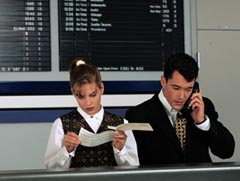If you read yesterday's post and thought, "Hey, that guiding principles thing sounds good - what's that look like?" I have just the resource for you: Rosa Say's book "Managing With Aloha."
This book is all about guiding principles, and Rosa relates her personal experiences as a manager in the context of Hawaiian values. She goes through 18 different values, relating personal stories along the way and providing helpful advice on how to manage with integrity, openness, respect, accountability, camaraderie, and love (yes, love is compatible with business).
For me, some of the most valuable stories are those about situations where she missed cues from her employees and made management mistakes. She then goes on to discuss what she learned from the experience, and how she tried to make it right.
For example, she tells a story about "unintentional neglect" in which she reassigned one of her employees to a new job, with the intent of recognizing her past contributions. However, the employee was demoralized because they felt they were no longer part of the "inner circle" of Rosa's organization after the reassignment. In the book, you can clearly feel the turmoil Rosa went through to try to resolve this and repair the relationship.
She also relates a number of stories about employees who made poor or self-destructive choices, and how she dealt with them in a way that respected them, held them accountable for their personal choices, but helped them get through it (like I said, love is compatible with business).
For example, there's a story about how she fired two of her staff for coming to work intoxicated. However, because she felt a responsibility to help them rather than wash her hands of them, she arranged for both of them to enter rehab programs (and somehow got the company to foot the bill for it!). You should read the book to find out how that turns out - very interesting.
The bottom line? This is not a management "how to" book - this is a management "why" book. I recommend it highly to anyone, managers or not, but I think it's a must-have for any leader who wants to create more cohesiveness and sense of purpose within their organizations.
If you want to get a taste of Managing with Aloha before you pick up the book, head on over to Rosa's blog, Talking Story with Say Leadership Consulting. You'll find that Rosa not only talks a good story - she lives a pretty good story, too.
Read More



 She bought two dry-erase calendars that we attach to our refrigerator magnetically. The top one always represents the current month, the bottom one is next month.
She bought two dry-erase calendars that we attach to our refrigerator magnetically. The top one always represents the current month, the bottom one is next month.